Tag: Spice Bridge
Reintroducing Taste of Congo owner Caroline Musitu
We’re excited to introduce you to the food vendors that will offer cuisines from around the world at Spice Bridge, our new food hall opening on Sept. 8.
You may already be familiar with the vendor we’re featuring today! Taste of Congo owner Caroline Musitu joined our Food Business Incubator in 2018, and has grown her business at pop-ups, catering events, and FIN’s Taste Around the Globe booth at farmers markets. Caroline introduced herself in this video last year.
Originally from the Congolese city of Kinshasa, Caroline grew up helping her mother cater weddings, parties, and church meetups. Several years ago, Caroline fled armed conflict in the Democratic Republic of Congo and started a new life in South King County. Realizing there were no Congolese food businesses in our region, she launched Taste of Congo to share her home country’s unique flavors with her new community.
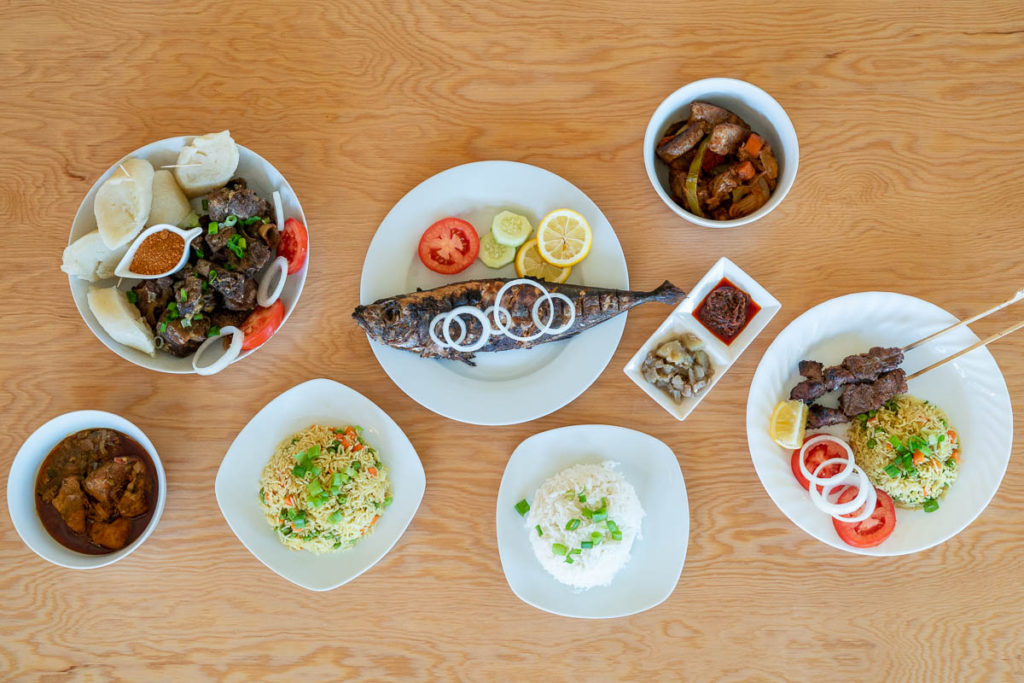
We recently spoke with Caroline about her Spice Bridge menu, what she’s learned as a business owner, and her dreams for Taste of Congo.
Can you please describe a few of the dishes that you'll offer at Spice Bridge?
Ntaba, grilled goat, is popular to eat after work in Congo. I serve it on brown paper like they do in Congo. We eat it with kwanga [boiled fermented cassava], and we put toothpicks in the kwanga to make it easier to share.
We can also talk about beignet—they’re popular, too! Mikate is the Congolese word for them. They’re deep-fried dough. In Congo in the morning there are mikate vendors on the corners of the streets. They're out there early, at 6 or 7, so that when people get up for work they can come by to get breakfast. But you can eat beignet anytime—in the morning, afternoon, and evening. We like to eat them with peanut butter—it's so good!
And of course there’s chicken stew, poulet a la moamba. It's a popular dinner cooked with onion, garlic, and tomato.

You joined FIN's Food Business Incubator in 2018. What have been some of the highlights of the last two years?
I didn't know how to start the business, but FIN helped me and made it easy for me to start. I've done farmers markets, pop-ups, and some catering jobs. The best experience has been setting up at farmers markets. I've met a lot of customers, including some that had lived in my country, and they got so excited to see Congolese food.
What have you learned, and how has your business changed?
I learned how to manage a website and do things online that I didn't know before. When COVID happened, FIN helped me set up an ordering website so people could order my food for pickup. I keep learning, and I know I will learn more as my business grows at Spice Bridge.
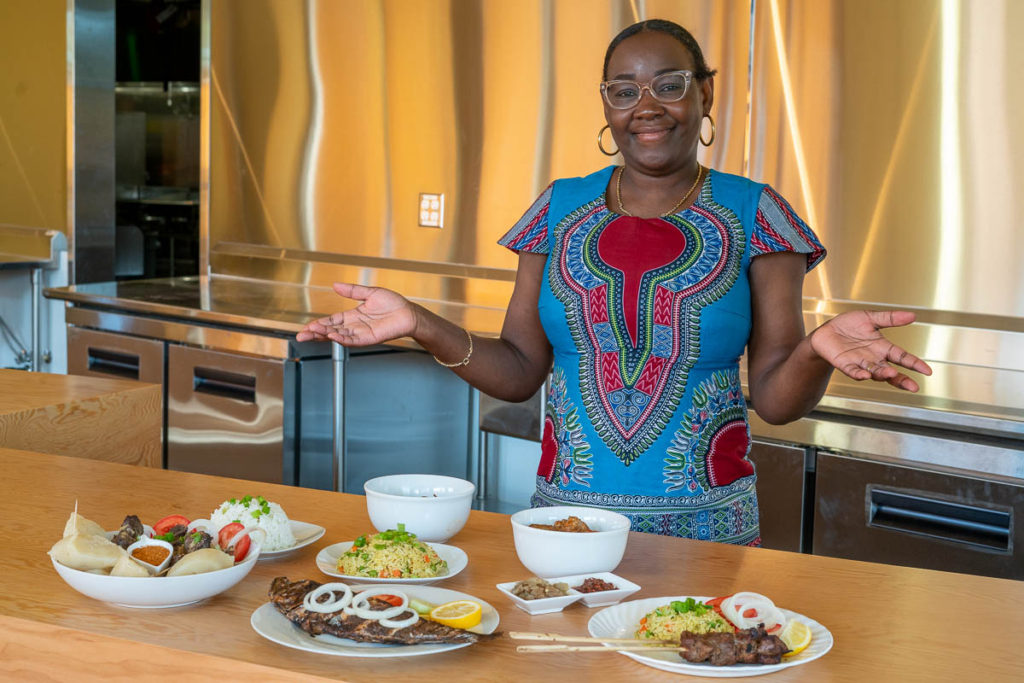
When you visited the Spice Bridge space for the first time last month, it was obvious that you were very excited. What will this new facility mean for you and your business?
It's a nice building, very beautiful! It means so much to my business. More customers will know me, my business will grow, I’ll have more income, and I will be more independent.
What is your dream for Taste of Congo?
My dream is to see Taste of Congo become its own restaurant, and also offer packaged foods, like my chili sauce. I want to ship my foods all over the United States. I want for everybody to try them!
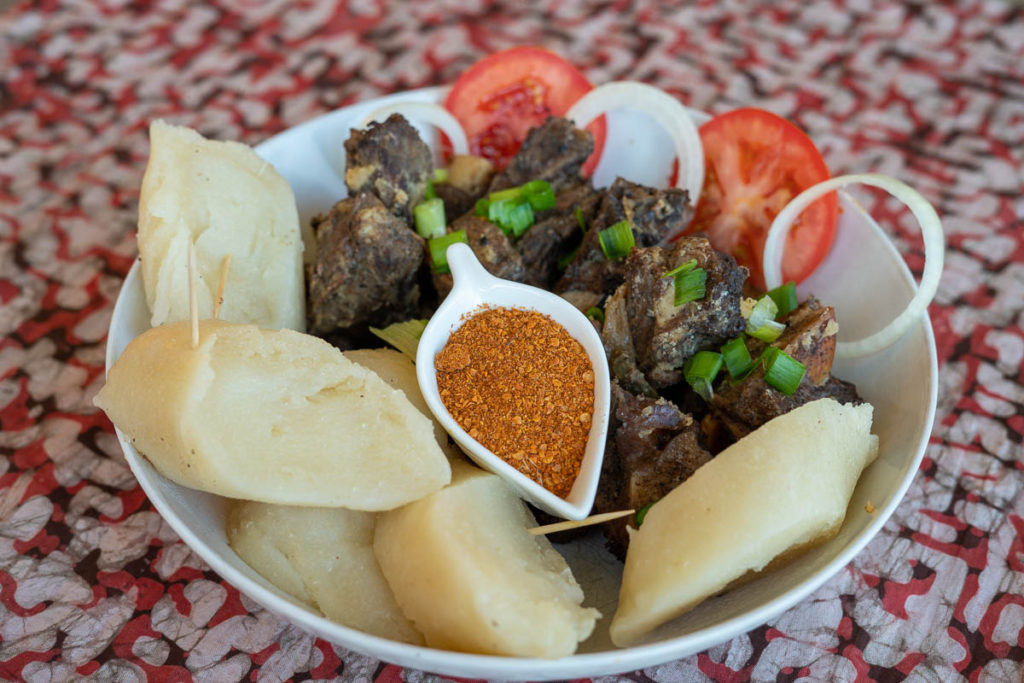
Visit Spice Bridge
Starting on Sept. 8, you’re invited to come by Spice Bridge to order food from Taste of Congo and other vendors. We’ll have takeout and outdoor dining available, and we’re also working on delivery options—stay tuned!
Taste of Congo will be open at Spice Bridge on Tuesdays and Saturdays from 11 a.m. to 8 p.m., and on Sundays from 10 a.m. to 5 p.m. Taste of Congo is also available to cater events.
Contact Taste of Congo
Website: tasteofcongo.square.site
Phone: (206) 778-5615
Email: tasteofcongoseattle@gmail.com
Facebook: @tasteofcongo
Instagram: @tasteofcongoseattle
Meet Moyo Kitchen owners Mwana Moyo and Batulo Nuh
We’re excited to introduce you to the businesses that will sell cuisines from around the world at Spice Bridge, our new food hall opening in September! Today we’d like for you to meet the owners of Moyo Kitchen.
Mwana Moyo and Batulo Nuh each make up one half of Moyo Kitchen. Mwana originally hails from Tanzania. Batulo, a Somali, was raised in Kenya. Here in King County, they bonded over their shared love of food, cooking, and celebrations. The two neighbors have used both their similarities and differences to create a unique combination of authentic East African food at Moyo Kitchen.
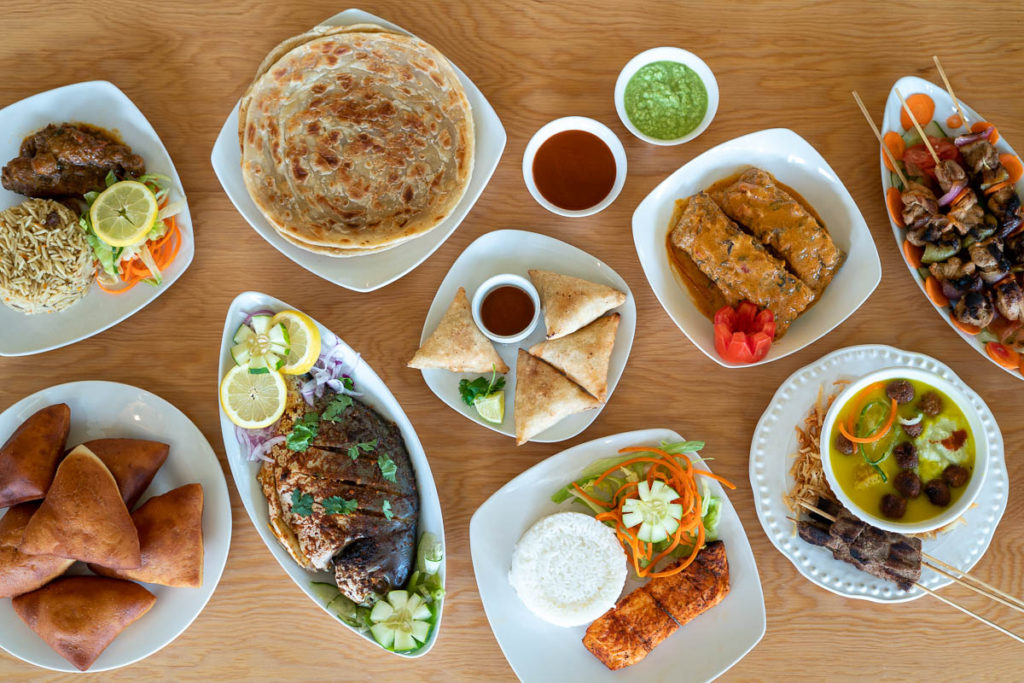
Dedicated to their craft of cooking and to their community, Mwana and Batulo also work as a caregiver and a social services case manager, respectively. Although Mwana has previously provided small-scale catering, FIN’s Food Business Incubator is helping to scale Moyo Kitchen, which will continue to offer catering while finding a new home at Spice Bridge.
In addition to being Mwana’s last name, Moyo is also Swahili for “heart,” which the partners definitely bring to the kitchen. Their hope for Moyo Kitchen is to continue growing, sharing love and culture with people through good food!
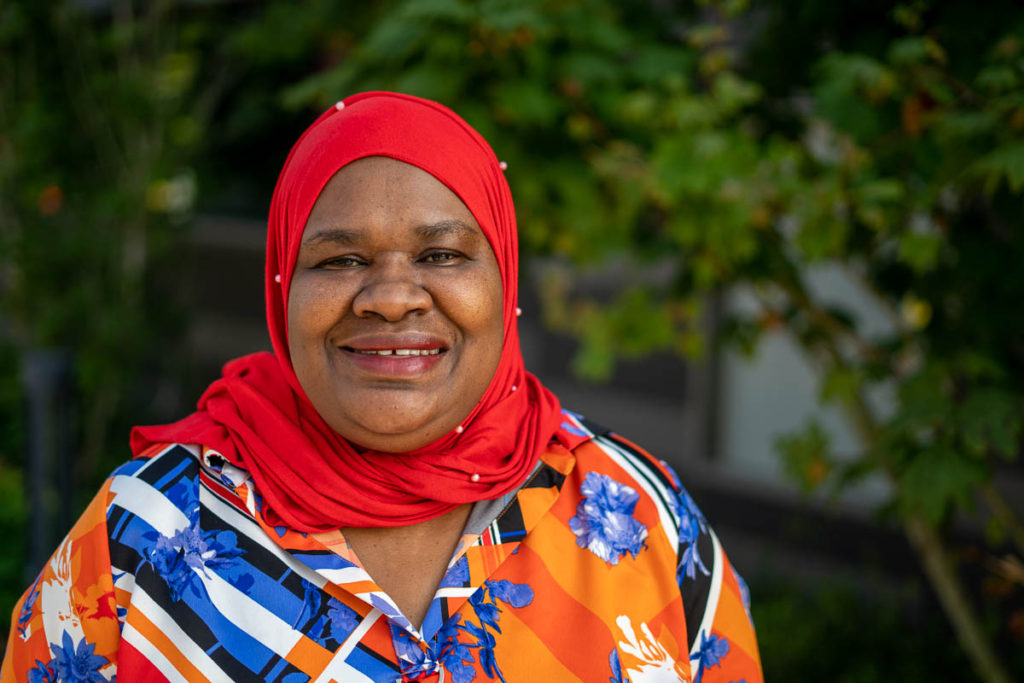
We spoke with Mwana and Batulo about how they learned to cook, the Zanzibari spices they use, and what it’s like to start a food business.
What type of cuisine do you offer?
Batulo: Mwana is from Tanzania. I’m Somali but raised in Kenya, so we have these three cultures combined that makes us unique.
Mwana: We offer catering and will also have a kiosk at Spice Bridge. Through catering we’ll be able to offer more options, depending on what customers want. Everything will be halal. We’ll have a lot of options for everyone! I know for sure people who try it will want to come again.
Can you talk about what makes Moyo Kitchen’s food special?
Mwana: The spices are from my country, Zanzibar, which we import: cumin, cloves, black pepper, garam masala, tamarind masala. All of those spices we are going to use at the kiosk. The way I cook, the way I mix together the food, it’s the way I learned to cook from my grandma.
Batulo, where did you first learn to cook?
Batulo: I learned from my mom, which she learned from her mom and her older sisters.
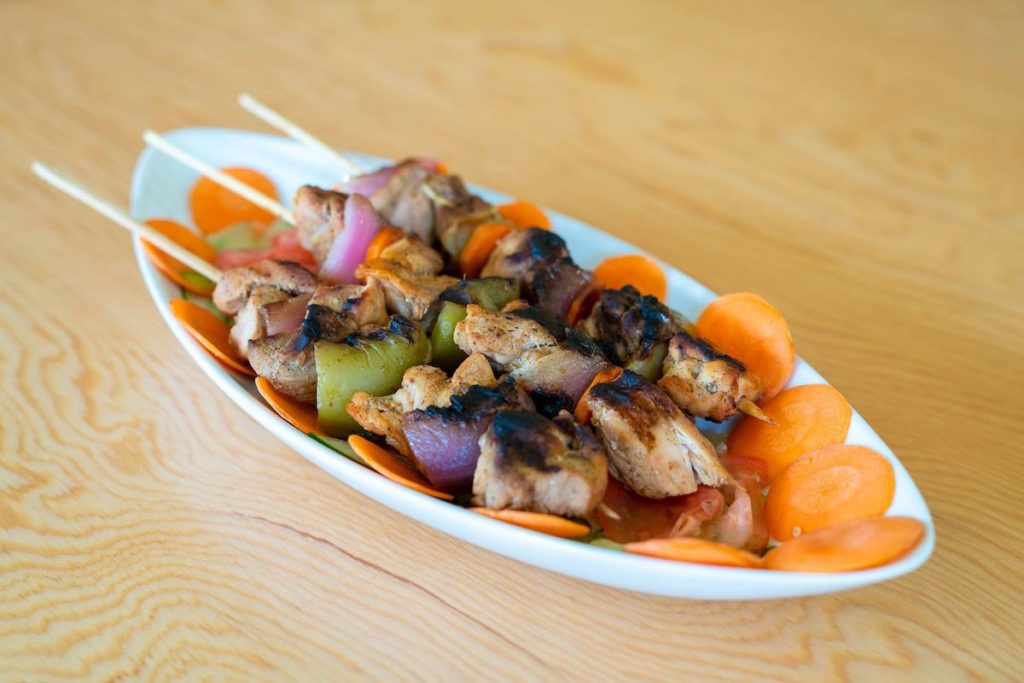
Can you talk about your personal story?
Mwana: I’m from Zanzibar, Tanzania. I came to America in 1998 with my two children. I have lived in Washington since then, never moved. When I came here my goal was to open my own restaurant, but it was hard. At that time I didn’t have anything. I went to school and asked people how to do this. In 2019, my auntie introduced me to Njambi [FIN’s Cultural Outreach Specialist]. She told her, “She knows how to cook, maybe we can put her in our program.” So this year I made it into the program and started.
Batulo: I started helping my mom cook when I was 10 or 12. My mom cooks a lot, all the time, at least three times a day. Me, being the oldest girl, mostly helped prepare the food. I would see her mixing all this food together without measuring. It is hard to follow what she does because there’s no measuring, it's all eyeballing. That is how I got introduced to cooking. And whenever we had a multicultural day at school, I used to love sharing the food.
I’m Somali but raised in Kenya; I have the Kenyan culture but also the Somalian culture. I speak both languages, I cook both foods in the house all the time. And Tanzanians and Kenyans, they have the same language as well, and our food is also similar—with a little twist.

How did those conversations start about having a business together?
Mwana: I’ve been thinking about this for a long long time, and I’ve been cooking for a long time, 20 years.
Batulo: We would cook for parties and celebrations, and we started sharing our food. Then we talked about how similar it was. We talked about being in business together for some time. The financials and finding a place was hard. It is very expensive to find a place and then to pay each month is a lot. I just recently got married, so I am still starting my life. Mwana is a single mom. We both work. It is hard to stop working and focus on our dream, because at the same time we have to pay the bills. Last year Mwana informed me about the Food Innovation Network, and we said we were going to do it. When we got this opportunity it was perfect because FIN is helping us and guiding us with each step we have to take.
Visit Spice Bridge
Starting in September, you’re invited to come by Spice Bridge to order food from Moyo Kitchen and other rotating businesses. We'll have takeout and outdoor dining available, and we’re also working on delivery options—stay tuned!
Moyo Kitchen will be open at Spice Bridge on Fridays and Saturdays from 11 a.m. to 8 p.m., and on Sundays from 10 a.m. to 5 p.m. Moyo Kitchen is also available to cater events.
Contact Moyo Kitchen
- Website: moyokitchen.square.site
- Phone: (425) 502-0825
- Email: moyokitchen20@gmail.com
- Instagram: @moyokitchen20

Thanks to FIN volunteer Lily Rybarczyk for assistance writing this Q&A!
Meet Seatango owner Monica Di Bartolomeo
We’re thrilled to introduce you to the businesses that will sell cuisines from around the globe at Spice Bridge, our new food hall opening in September! Today we’re featuring Seatango.
Monica Di Bartolomeo and her husband, Ariel Firpo, offer authentic Argentinian savory dishes and sweets inspired by their upbringing in Buenos Aires, where they woke each morning to pleasant smells wafting in from local bakeries. Through Seatango’s artisanal baked goods, Monica and Ariel bring a similarly delightful sensory experience to Spice Bridge—you’ll love the aromas and flavors of their pastries, empanadas, and more!

We spoke with Monica about the culinary heritage that informs her signature offerings, the challenges of starting a small business, and her dreams for Seatango.
Tell us about your business.
Seatango offers authentic Argentinian cuisine. We’re the only local business that serves facturas (Argentinian pastries) made from scratch! We have a catering service that specializes in beautifully presented picadas (savory appetizers), mesa dulce (a variety of desserts), empanadas, and asado (grilled meats). We’re excited to offer facturas, empanadas, mate tea, coffee drinks, and more at our Spice Bridge kiosk starting in September!
What inspired you to start this business?
Every morning in Buenos Aires, I would wake up to the wonderful smell of facturas coming from the local bakery. We had them for breakfast most mornings, and anytime we visited friends for mate [tea] time. My husband, Ariel, and I love facturas, but we couldn’t find them in Washington state. We decided we wanted to bring this tradition of fresh, delicious pastries to our area. In addition to sweets, we offer authentic Argentinian appetizers and full meals.

What do you like best about your work?
I love the satisfaction of people enjoying my food, happy and smiling. It makes me feel emotional just thinking about it! And I love it when customers ask to meet the chef.
What is something people might be surprised to learn about you or your business?
My husband and I are both from Argentina, and our ancestors came from Italy, Spain, and Arabic countries. This heritage was reflected in the foods we ate growing up, and continues to influence our menu now. We use many recipes and techniques we learned from our families. My father was an Italian-Argentian chef, and I learned a lot helping him in the kitchen as a child. Ariel’s mother and grandmother were both pastry chefs, and they taught both Ariel and me how to make old-fashioned facturas. They all made food from scratch with love, and we’re happy to continue that legacy.
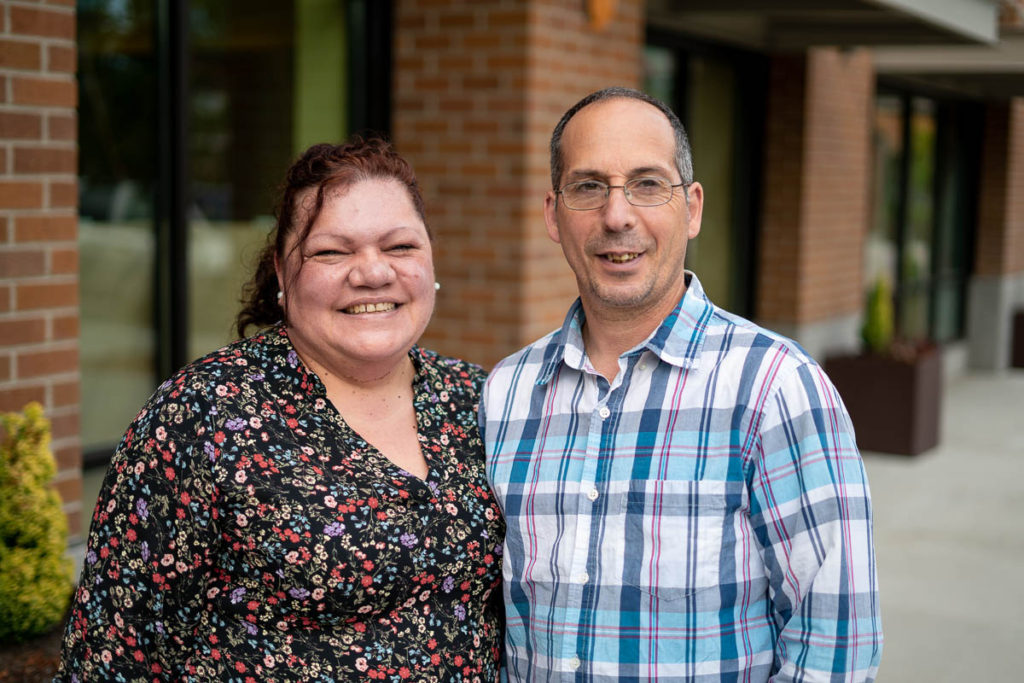
What’s been the biggest challenge in launching or running your business? What types of services or programs have been helpful?
We’ve been persistent in pursuing our dream of owning this business, but it’s been challenging to get the financial capital to invest in things like permits, equipment, and marketing expenses. Joining Ventures has been a great help. Using their commercial kitchen and starting as a catering company has allowed us to have lower starting costs compared to opening our own space right away.
I’ve had to learn to let others support me. Sometimes we think we’re Superman or Superwoman, but it’s a heavy burden to do it all on your own. It’s better to work as a team. That’s one reason I’m excited to be part of FIN’s Incubator: I’m working alongside other business owners, and we can help each other.
What is your dream for Seatango?
We want to have our own brick-and-mortar shop one day. Opening our kiosk at Spice Bridge is a very big step toward that dream!
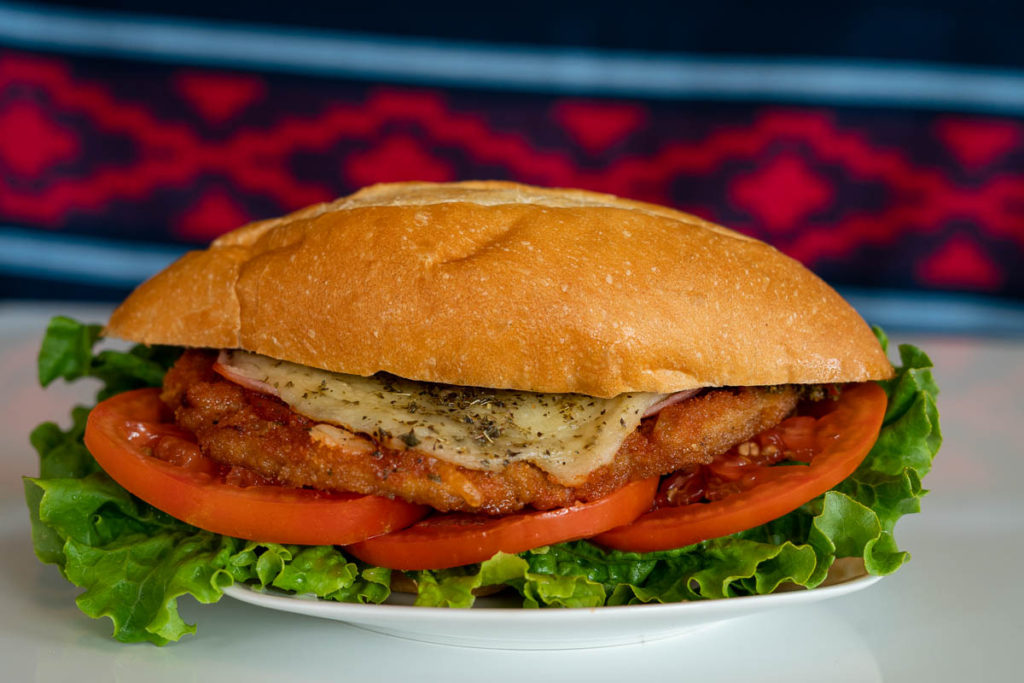
Visit Spice Bridge
Starting in September, you’re invited to stop by Spice Bridge to order Seatango and other wonderful cuisines for takeout or outdoor dining. (We’re also working on delivery options—stay tuned.) Seatango will be open on Wednesdays, Thursdays, and Fridays from 11 a.m. to 8 p.m. Seatango is also available to cater events.
Contact Seatango
- Website: seatangofoods.com
- Email: monica@seatangofoods.com
- Instagram: @seatangofoods
- Facebook: @SeaTangoArg

Thanks to FIN volunteer Levi Robischon for assistance writing this Q&A!
Meet Afella Jollof Catering Owners Adama Jammeh and Oumie Sallah
We’re excited to introduce you to the businesses that will sell cuisines from around the world at Spice Bridge, our new food hall opening in September! First up: Afella Jollof Catering.
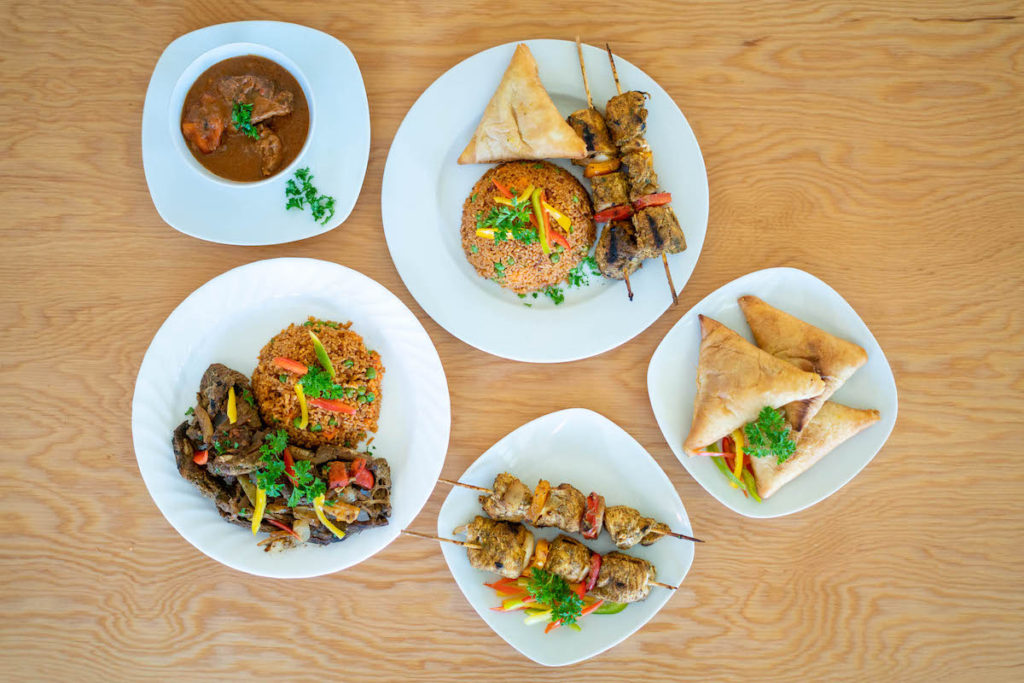
Raised in Gambia, Adama Jammeh came to King County three years ago by way of St. Louis and Atlanta. She was long considered an exceptional cook by her community, who encouraged her to seek bigger opportunities. Here in the Seattle area, Adama and her sister Oumie Sallah have been able to expand their culinary skills and offerings, founding Afella Jollof Catering. After joining our Food Business Incubator last year, they have offered their mouthwatering cuisine at farmers markets, pop-ups, and catered events.

Adama explains that afella means “tastes good” in the Serer language and jollof is a local name for the people. The sisters specialize in Senegambian cuisine. Focusing on quality, health, and authenticity in their recipes, Adama and Oumie create everything down to the spices from scratch.
We spoke with Adama about the difficulties in starting a catering company, her dreams for Afella Jollof Catering, and their signature dish.
Can you please describe your business?
Our business focuses on Senegambian food—dishes from the West African countries of Senegal and Gambia, which have a shared culture and cuisine.
Everything is authentic and we cook from scratch. We get the best ingredients and make sure they are all healthy. We don’t buy pre-cooked or pre-whatever. We make our own seasonings, which make everything so tasty! We do catering, and we are also planning to sell the spices we make from scratch.
For those of us that don’t know a lot about Senegalese and Gambian cuisine, can you describe a few dishes?
Jollof is one of our tribes in Gambia and Senegal, and jollof rice is one of our main dishes. I see it in a lot of African cuisines, but Gambia and Senegal are the origins of jollof rice! It's fried rice, cooked with our own spices and vegetables. It’s rich in nutrients; it has everything that we need. The seasonings include garlic, herbs, ginger—all of those are good for the system. That’s what you use as the base to cook the rice. It’s something that everybody wants to taste.
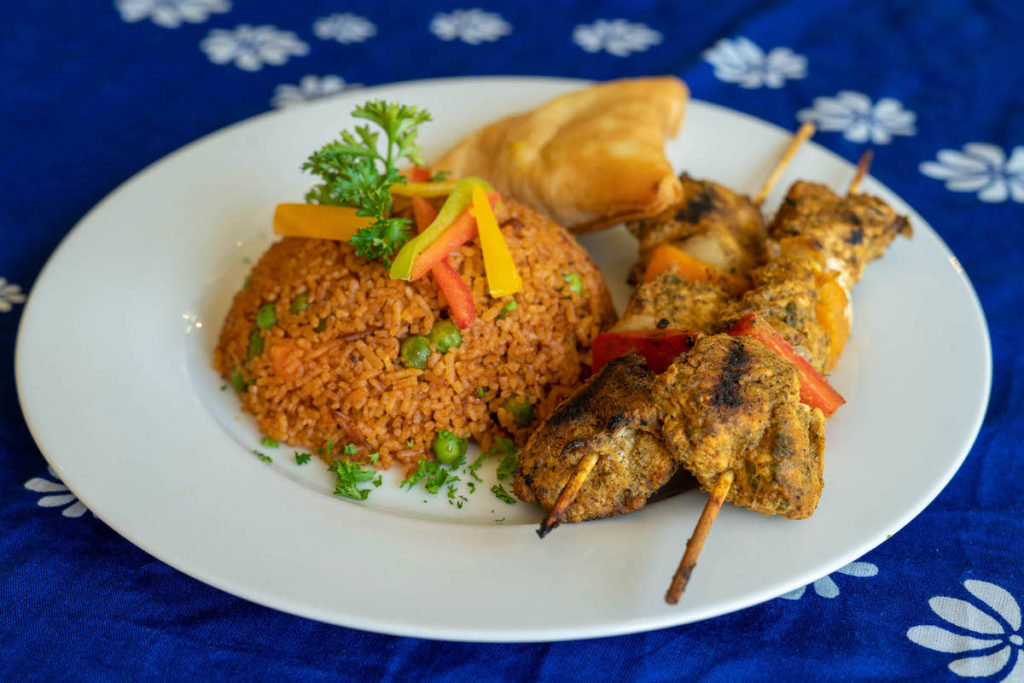
And then we have the yassa, which includes grilled chicken with an onion sauce. We’re going to be introducing this peanut butter stew too, called mafé. We tried it once at [FIN’s Taste Around the Globe booth at] Pike Place, and people loved the taste. It’s one of the most nutritious dishes, made of peanut butter with a base of slow-cooked onion and tomatoes. You can eat it like a soup, but we also serve it with rice. We make it with beef, chicken, or veggies.
We have lots of dishes, so we’re going to be alternating our menu! We have a whole lot in mind that we want to add to Spice Bridge.
Can you tell me what challenges you've encountered in starting your business?
The challenges we’ve encountered are marketing, and cooking space. Now, thankfully, we are getting FIN’s help with marketing and we are looking forward to having our own cooking space at Spice Bridge. Our hopes are really high!
So Afella Jollof Catering will have a home at Spice Bridge—that’ll be great! What is your dream for your business?
The dream for our business is for us to be well recognized, and we’re off to a good start. At Pike Place, we have people who traveled and referred people to come back. We want to show people what we can do, become well-known, and we want to grow from Spice Bridge. I know it’s going to be a long-running thing!

Can you tell me more about your plans for the spices you're making?
Right now we sell them in our own community, but our hopes are to package them and sell them online, in stores, and everywhere!
I’m very impressed by what Lilian Ryland is doing. Packaging food has been on my mind, and when I saw what she’s doing, I was like, “Yes, this is what we wanted!” [Editor’s note: Lilian Ryland has grown her business, Naija Buka, while participating in our Food Business Incubator. Lilian started with catering and pop-ups, and now has a packaged product line that is available at PCC stores and online. Her success is an inspiration to Adama and other entrepreneurs, and Lilian is also a great mentor.]
Tell me a little more about you and Oumie.
We were raised learning how to cook. Our mom taught us how to cook, and then we had a passion for it. We like organizing events, hosting, cooking good food, and presenting it. We love inviting people to come over.

We’ve been known for being exceptional cooks in our community, and they started telling us that we need to do something bigger. One of our nieces hooked us up with [FIN Cultural Outreach Specialist] Njambi Gishuru, who believed we would make a good catering outfit. Njambi encouraged us to go outside our community and let people try what we make.
The most exciting thing was when we were invited for a food tasting event at the Port of Seattle, they were very impressed by our food. I’ve been in the U.S. for 16 years, and Seattle has been the best part. This is where I was able to bring my cooking skills and people know what we are capable of doing. Here we are with FIN and it is very exciting!
Visit Spice Bridge
Starting in September, you’re invited to stop by Spice Bridge to order Afella Jollof Catering and other wonderful cuisines for takeout or outdoor dining. (We’re also working on delivery options—stay tuned.) Afella Jollof Catering will be open on Tuesdays, Wednesdays, and Thursdays from 11 a.m. to 8 p.m. They're also available for events, with service ranging from all-inclusive to drop-off.
Contact Afella Jollof Catering
- Website: afellajollof.square.site
- Email: afellajollofcatering@gmail.com
- Phone: (425) 465-6600 or (425) 399-4628
- Facebook: @afellajollof
- Instagram: @afellajollof

Thanks to FIN volunteer Lily Rybarczyk for assistance writing this Q&A!
Spice Bridge opens in just a couple of weeks!
Exciting news: We'll open the doors to Spice Bridge on Sept. 8! You're invited to come by for takeout and outdoor dining. Delivery options are in the works—stay tuned.
During our first month, four food businesses will offer delicious foods and beverages:
- Moyo Kitchen will serve Somali-Kenyan-Tanzanian fusion food inspired by Zanzibar, the world’s spice capital.
- Afella Jollof Catering will cook up Gambian/Senegalese cuisine.
- Seatango will craft artisan savory and sweet pastries from Argentina.
- Taste of Congo will offer authentic Congolese cuisine.
In October, four more businesses will join the rotation:
- Wengay’s Kitchen will be the area’s go-to source for authentic Filipino food.
- Jazze's will offer Afghani food made from organic, locally-grown ingredients.
- Theary Cambodian Foods will serve authentic Cambodian/Khmer cuisine.
- WUHA will offer "fast" Eritrean/Ethiopian food options, serving both authentic foods and American foods cooked with Eritrean spices as a gateway to more traditional dishes.
We'll introduce you to the businesses one by one starting this week. Sign up for our email updates and follow Spice Bridge on Facebook and Instagram for the latest news!
Join our Kitchen Club
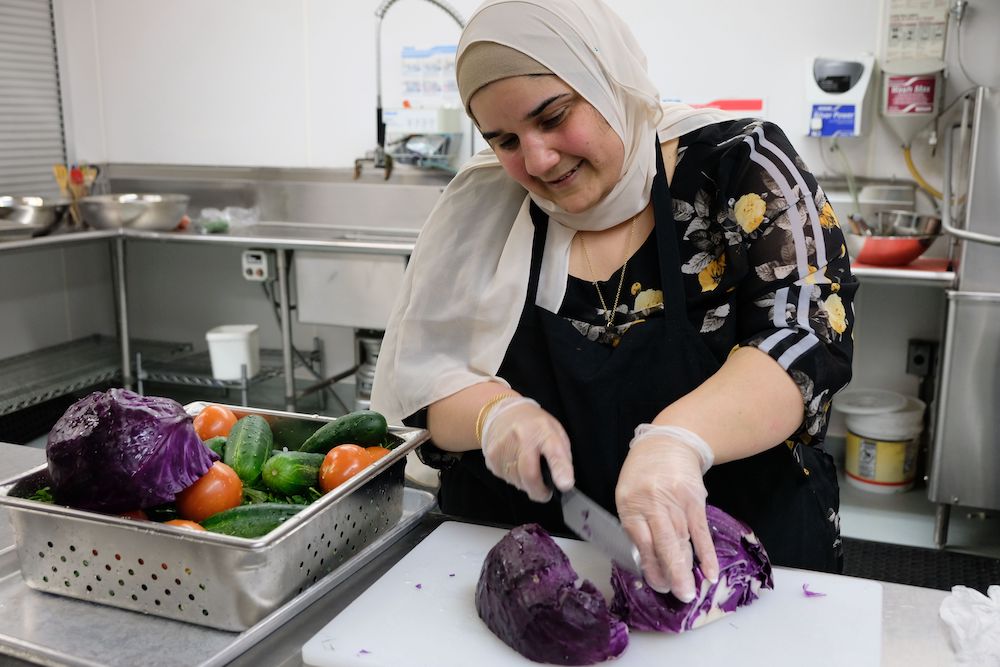
Eater Seattle just published a guide on how to help stop hunger and support local food businesses in our community. We're honored that FIN was included as an organization to support!
Here's a fun opportunity for you to get involved and support the food businesses that will call Spice Bridge home: Join our Kitchen Club to help us equip the facility with essentials like pots and pans. You can become part of the club—and have your name listed as a founding member!—one of three ways:
- Contribute $25 or more at our online fundraising page.
- Donate in-kind commercial grade kitchen equipment. See our wish list.
- Purchase items directly through our Webstaurant wish list, and they will be mailed to us.
Join our Spice Bridge Kitchen Club!
The kitchen at Spice Bridge will open soon, and we need your help to equip it with essentials like prep tables, pots, and pans. Please join our Kitchen Club to help us raise $15,000. You can become part of the club—and have your name listed as a founding member!—one of three ways:
1. Donate $25 or more at our online fundraising page. An amazing supporter has committed to match cash contributions up to $2,500—don't miss this opportunity to double your impact!
2. Donate in-kind commercial grade kitchen equipment. See our wish list.
3. Purchase items directly through our Webstaurant wish list, and they will be mailed to us.
